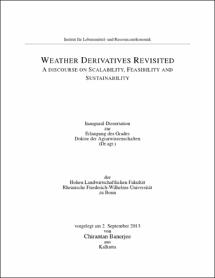Banerjee, Chirantan: Weather Derivatives Revisited : A discourse on scalability, feasibility and Sustainability. - Bonn, 2014. - Dissertation, Rheinische Friedrich-Wilhelms-Universität Bonn.
Online-Ausgabe in bonndoc: https://nbn-resolving.org/urn:nbn:de:hbz:5n-35566
Online-Ausgabe in bonndoc: https://nbn-resolving.org/urn:nbn:de:hbz:5n-35566
@phdthesis{handle:20.500.11811/5836,
urn: https://nbn-resolving.org/urn:nbn:de:hbz:5n-35566,
author = {{Chirantan Banerjee}},
title = {Weather Derivatives Revisited : A discourse on scalability, feasibility and Sustainability},
school = {Rheinische Friedrich-Wilhelms-Universität Bonn},
year = 2014,
month = apr,
note = {Over the last decade, weather derivatives have been offered in developing countries to mitigate weather risk in agriculture, but the demand remains low. Chapter One explains this demand anomaly by decomposing an insurance seeker’s motivation into three summands. The first summand discusses the effect of contractual non-performance due to basis risk, the second one discusses the effect of subsidies and the third one discusses the effect of adverse selection on motivation to purchase weather derivatives.
Chapter Two analyses the basis risk of wind indexed weather derivatives for Typhoon risks of rice farmers in the Philippines. A regression analysis could not reject the null hypothesis that wind speed does not affect rice yields. Resultant high basis risks lead to mitigation of risk through diversification and not indemnification.
Chapter Three introduces pay-off period as a factor for frequent post-pilot discontinuation of weather derivatives. The discounted pay-off period and loss ratio are introduced as important decision variables for insurers, in deciding the loan or grant parameters as well as quota share reinsurance parameters. Restructuring the pilot programmes as well as coupling weather derivatives with micro-loans have been recommended.
Chapter Four introduces the case of inter-temporal adverse selection in weather derivatives. Farmers might base their insurance purchase decisions on weather outcomes of prior months. Thereof resultant financial repercussion of adverse selection on the insurers’ reserve has been estimated. Additionally, a method to identify the source of this information asymmetry has been proposed. This helps the insurer decide whether to restructure the product and when to initiate the contract.
Weather derivatives are necessary proxies to traditional crop insurance. This dissertation makes theoretical as well as empirical contributions towards a growing literature on weather derivatives and its participation pattern. The goal is to help policy makers and insurers make better designs and decisions so that weather derivatives can perform efficiently as tools of poverty alleviation by hedging weather related risks in agriculture.},
url = {https://hdl.handle.net/20.500.11811/5836}
}
urn: https://nbn-resolving.org/urn:nbn:de:hbz:5n-35566,
author = {{Chirantan Banerjee}},
title = {Weather Derivatives Revisited : A discourse on scalability, feasibility and Sustainability},
school = {Rheinische Friedrich-Wilhelms-Universität Bonn},
year = 2014,
month = apr,
note = {Over the last decade, weather derivatives have been offered in developing countries to mitigate weather risk in agriculture, but the demand remains low. Chapter One explains this demand anomaly by decomposing an insurance seeker’s motivation into three summands. The first summand discusses the effect of contractual non-performance due to basis risk, the second one discusses the effect of subsidies and the third one discusses the effect of adverse selection on motivation to purchase weather derivatives.
Chapter Two analyses the basis risk of wind indexed weather derivatives for Typhoon risks of rice farmers in the Philippines. A regression analysis could not reject the null hypothesis that wind speed does not affect rice yields. Resultant high basis risks lead to mitigation of risk through diversification and not indemnification.
Chapter Three introduces pay-off period as a factor for frequent post-pilot discontinuation of weather derivatives. The discounted pay-off period and loss ratio are introduced as important decision variables for insurers, in deciding the loan or grant parameters as well as quota share reinsurance parameters. Restructuring the pilot programmes as well as coupling weather derivatives with micro-loans have been recommended.
Chapter Four introduces the case of inter-temporal adverse selection in weather derivatives. Farmers might base their insurance purchase decisions on weather outcomes of prior months. Thereof resultant financial repercussion of adverse selection on the insurers’ reserve has been estimated. Additionally, a method to identify the source of this information asymmetry has been proposed. This helps the insurer decide whether to restructure the product and when to initiate the contract.
Weather derivatives are necessary proxies to traditional crop insurance. This dissertation makes theoretical as well as empirical contributions towards a growing literature on weather derivatives and its participation pattern. The goal is to help policy makers and insurers make better designs and decisions so that weather derivatives can perform efficiently as tools of poverty alleviation by hedging weather related risks in agriculture.},
url = {https://hdl.handle.net/20.500.11811/5836}
}






